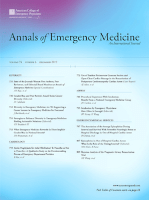
ANNALS OF EMERGENCY MEDICINE
Scope & Guideline
Shaping the Future of Emergency Medical Science
Introduction
Aims and Scopes
- Innovative Clinical Practices:
The journal emphasizes research on innovative clinical practices in emergency medicine, including new treatment modalities and techniques for common emergency conditions. - Public Health and Emergency Preparedness:
Research on the role of emergency medicine in public health, including responses to pandemics, natural disasters, and other public health emergencies. - Patient-Centered Care and Health Disparities:
A focus on patient-centered approaches to care, particularly addressing health disparities and the social determinants of health that affect patient outcomes in emergency settings. - Emergency Medicine Education and Training:
The journal highlights advancements in education and training for emergency medicine professionals, including curriculum development and training methodologies. - Quality Improvement and Patient Safety:
Research on quality improvement initiatives and patient safety measures in emergency departments to enhance care delivery and reduce errors. - Use of Technology and AI in Emergency Medicine:
Exploration of the integration of technology, including artificial intelligence and telemedicine, in emergency care to improve efficiency and patient outcomes.
Trending and Emerging
- Telehealth and Remote Care Solutions:
The integration of telehealth and remote care solutions has gained significant attention, particularly in response to the COVID-19 pandemic, highlighting the need for flexible care delivery models. - Mental Health and Substance Use Disorders:
Research focusing on mental health crises and substance use disorders is increasingly prevalent, reflecting a growing recognition of their impact on emergency care. - Artificial Intelligence and Machine Learning:
The application of artificial intelligence and machine learning in emergency medicine is a burgeoning area of interest, with studies exploring their potential to improve diagnostics and patient outcomes. - Geriatric Emergency Medicine:
There is a rising focus on geriatric emergency medicine, addressing the unique needs and challenges of older adults in emergency settings. - Health Equity and Social Determinants of Health:
Emerging research emphasizes health equity and the impact of social determinants on patient outcomes in emergency care, driving efforts to address disparities. - Crisis Response and Emergency Preparedness:
The journal has seen an increase in articles related to crisis response and emergency preparedness, particularly in the context of pandemics and large-scale public health emergencies.
Declining or Waning
- Traditional Diagnostic Methods:
There has been a notable decline in research focusing solely on traditional diagnostic methods, such as basic imaging techniques, as the field shifts towards more advanced, technology-driven approaches. - Invasive Procedures:
Studies centered around invasive procedures in emergency medicine are less frequently published, possibly due to a growing emphasis on non-invasive alternatives and patient safety. - Conventional Pain Management Strategies:
Research on conventional pain management strategies, particularly the use of opioids, is waning as the focus shifts towards multimodal and non-opioid approaches in light of the opioid crisis. - Generalized Emergency Medicine Protocols:
There is a reduction in the publication of generalized emergency protocols, with increasing interest in tailored, patient-specific care pathways.
Similar Journals
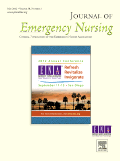
Journal of Emergency Nursing
Elevating Standards in Emergency Nursing ExcellenceJournal of Emergency Nursing, published by Elsevier Science Inc, serves as a premier platform for advancing the field of emergency nursing. Since its inception in 1975, this peer-reviewed journal has established itself as a vital resource for researchers, practitioners, and educators alike, with a notable impact factor and current ranking of #8 out of 32 in the Emergency Nursing category, placing it in the 76th percentile. The journal's commitment to the dissemination of high-quality evidence, innovative practices, and essential insights makes it an indispensable tool for those seeking to excel in acute care settings. Although not open access, the Journal of Emergency Nursing is dedicated to fostering knowledge and improving patient outcomes through robust research and comprehensive reviews, aligning closely with its mission to enhance emergency nursing practices and education through every issue until 2024 and beyond. For professionals and students keen on staying at the forefront of emergency care advancements, this journal provides a wealth of knowledge and resources, reflecting the critical issues and developments shaping the future of healthcare.

Journal of the American College of Emergency Physicians Open
Elevating Standards in Emergency Medicine Education and ResearchJournal of the American College of Emergency Physicians Open is a prominent Open Access journal published by WILEY that has been committed to advancing the field of emergency medicine since its inception in 2020. As a vital resource for researchers, clinicians, and students, this journal aims to disseminate innovative research findings, clinical guidelines, and educational resources that support the rapidly evolving landscape of emergency care. With a solid Q1 ranking in the emergency medicine category and positioned within the top 25 ranks of Scopus’ emergency medicine listings, the journal ensures high visibility and accessibility for critical research. As an open-access publication, it provides unrestricted access to its content, facilitating knowledge sharing and collaboration among professionals globally. The journal's significant impact on the field is reflected in its growing influence, underlining its relevance as an essential platform for advancing emergency medicine practice and research.
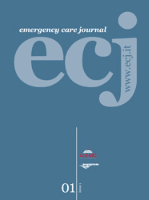
Emergency Care Journal
Catalyzing Change in Critical Care with Every PublicationThe Emergency Care Journal is a vital open-access publication dedicated to the field of emergency medical services and nursing, published by PAGEPRESS PUBL. Since its inception in 2005, the journal has aimed to provide a platform for researchers, clinicians, and scholars to share knowledge and advance practices in the critical domain of emergency care. With an ISSN of 1826-9826 and an E-ISSN of 2282-2054, the journal is committed to enhancing accessibility and reaching a global audience. Although its Scopus rankings reflect a competitive landscape, particularly in the ranks of Health Professions and Emergency Medicine, the journal continues to serve as an essential resource for emerging studies and professional insights. Nestled in Italy, the journal seeks to bridge the gap between academic research and real-world application, ultimately improving patient care and outcomes in emergency settings. As it converges into the years 2023 and 2024, Emergency Care Journal stands poised to foster scholarly discussions and innovative research that are crucial to the evolving landscape of emergency medicine.

BMC EMERGENCY MEDICINE
Transforming emergency medicine through innovative research.BMC Emergency Medicine is a premier, open-access journal that has been at the forefront of the field of emergency medicine since its inception in 2001. Published by BMC in the United Kingdom, this journal is distinguished by its impact factor and remarkable Q1 ranking in emergency medicine, placing it among the top-tier publications in this vital area of healthcare. With a current Scopus rank of #30 out of 109 in the category of Emergency Medicine, and occupying the 72nd percentile, BMC Emergency Medicine is a leading platform for researchers and practitioners alike to disseminate their findings related to urgent and critical care. The journal embraces a broad scope within emergency medicine, encouraging submissions on a wide range of topics including clinical practice, innovative techniques, public health, and policy issues that critically affect emergency care. The open-access model ensures that high-quality research is readily available to the global community, fostering collaboration and advancing knowledge in the field. For those dedicated to improving patient outcomes in emergency settings, BMC Emergency Medicine represents an invaluable resource and community.

Open Access Emergency Medicine
Connecting researchers to the forefront of emergency healthcare.Open Access Emergency Medicine, published by DOVE MEDICAL PRESS LTD, is a premier journal dedicated to the dynamic fields of Emergency Medicine and Emergency Nursing. With its ISSN 1179-1500, this journal has established a notable presence since its inception as an Open Access platform in 2010, offering unrestricted access to high-quality research and innovative practices in the area. As one of the leading journals in its field, it holds a respectable Q2 ranking in both Emergency Medicine and Emergency Nursing categories as of 2023, reflecting its commitment to advancing knowledge and fostering impactful research. The journal is indexed in prestigious databases with solid Scopus rankings, placing it in the 65th percentile for Emergency Medicine and the 64th percentile for Emergency Nursing, ensuring that contributions reach a diverse audience of researchers, practitioners, and students worldwide. With its focus on contemporary issues, this journal serves as an essential resource for the continual growth and development of emergency health services.

Australasian Emergency Care
Driving Innovations in Emergency Care Delivery.Australasian Emergency Care, published by ELSEVIER SCI LTD, stands out as a premier journal in the field of Emergency Nursing, currently holding a prestigious Q1 ranking and positioned in the top 85th percentile according to Scopus metrics. With an E-ISSN of 2588-994X, this journal has been a vital platform for disseminating cutting-edge research since its inception in 2018. Focused on enhancing the practice, education, and research surrounding emergency nursing, Australasian Emergency Care serves as an essential resource for clinicians, educators, and researchers, offering access to a wide array of high-quality peer-reviewed articles. The importance of this journal lies in its commitment to improving patient outcomes through evidence-based practices and innovations in emergency care, making it a pivotal resource for anyone dedicated to advancing their knowledge and expertise in this critical field.
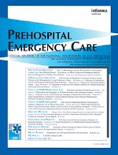
Prehospital Emergency Care
Enhancing Patient Outcomes with Rigorous Research.Prehospital Emergency Care is a leading journal in the fields of emergency medicine and nursing, published by Taylor & Francis Inc. With a significant impact on both disciplines and recognized in the first quartile (Q1) of Emergency Medicine and Emergency Nursing categories for 2023, this journal reflects the highest standards of scientific rigor and innovation. Each issue offers valuable insights into the latest research, clinical practices, and advancements in prehospital emergency care, making it an essential resource for researchers, healthcare professionals, and students alike. The journal covers a broad array of topics and aims to disseminate knowledge that enhances the field and improves patient outcomes. With its commitment to excellence, Prehospital Emergency Care plays a critical role in shaping the future of emergency services globally.

Annales Francaises de Medecine d Urgence
Exploring the Frontiers of Urgent HealthcareAnnales Françaises de Médecine d'Urgence is a prominent journal dedicated to the field of Emergency Medicine, published by LAVOISIER. With an ISSN of 2108-6524 and E-ISSN of 2108-6591, this journal aims to disseminate vital research and innovative practices pertinent to emergency care, addressing the dynamic challenges faced by healthcare professionals in acute medical settings. While it operates under a non-open access model, it maintains an important role in advancing knowledge in the discipline, evidenced by its categorization in 2023 as Q4 in Emergency Medicine with a Scopus ranking of #85 out of 109, placing it in the 22nd percentile. Spanning years from 2011 to 2024, this journal serves as a platform for researchers, practitioners, and students committed to improving patient outcomes and advancing the science of emergency medicine. With its thoughtfully curated articles and studies, Annales Françaises de Médecine d'Urgence is a crucial resource for anyone who aims to stay at the forefront of developments in emergency medical care.
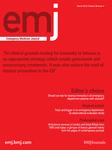
EMERGENCY MEDICINE JOURNAL
Advancing Critical Insights for Life-Saving MedicineEmergency Medicine Journal, published by BMJ Publishing Group in the United Kingdom, stands as a preeminent resource within the realm of emergency and critical care medicine. ISSN 1472-0205 and E-ISSN 1472-0213 reflect its commitment to accessible research, emphasizing open access options to enhance the dissemination of vital medical insights. The journal boasts an impressive categorization, achieving a Q1 ranking in Critical Care and Intensive Care Medicine, Emergency Medicine, and miscellaneous Medicine in 2023. With a focus on high-quality peer-reviewed articles, it serves as an essential platform for sharing innovative research and evidence-based practices that enhance patient care in emergency settings. Ranking 23rd in Emergency Medicine, with a commendable 79th percentile in Scopus rankings, it underscores its position as a leading journal among peers, making it indispensable reading for researchers, professionals, and students alike who seek to stay abreast of evolving trends and practices in emergency medicine and critical care.

Emergencias
Enhancing Lives with Groundbreaking Emergency Medicine FindingsEmergencias is a prestigious journal in the field of Emergency Medicine, published by the Sociedad Española de Medicina de Urgencias y Emergencias (SEMES). This journal has established itself as a vital platform for sharing cutting-edge research and practical insights, ranking in the top 20 of emergency medicine journals according to Scopus, with a commendable 82nd percentile performance. Since its inception, it has maintained a commitment to advancing knowledge and practice in emergency care, making contributions essential for both researchers and practitioners. The journal features diverse articles covering clinical guidelines, innovative techniques, and case studies, reflective of its importance in guiding timely medical interventions. As an open access publication, it encourages widespread dissemination of knowledge, fostering collaboration and understanding across the global emergency medicine community. Emergencias continues to publish high-quality research until 2024, making significant strides in enhancing emergency healthcare practices in Spain and beyond.